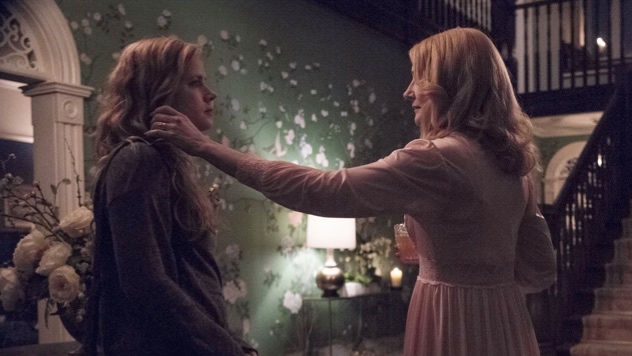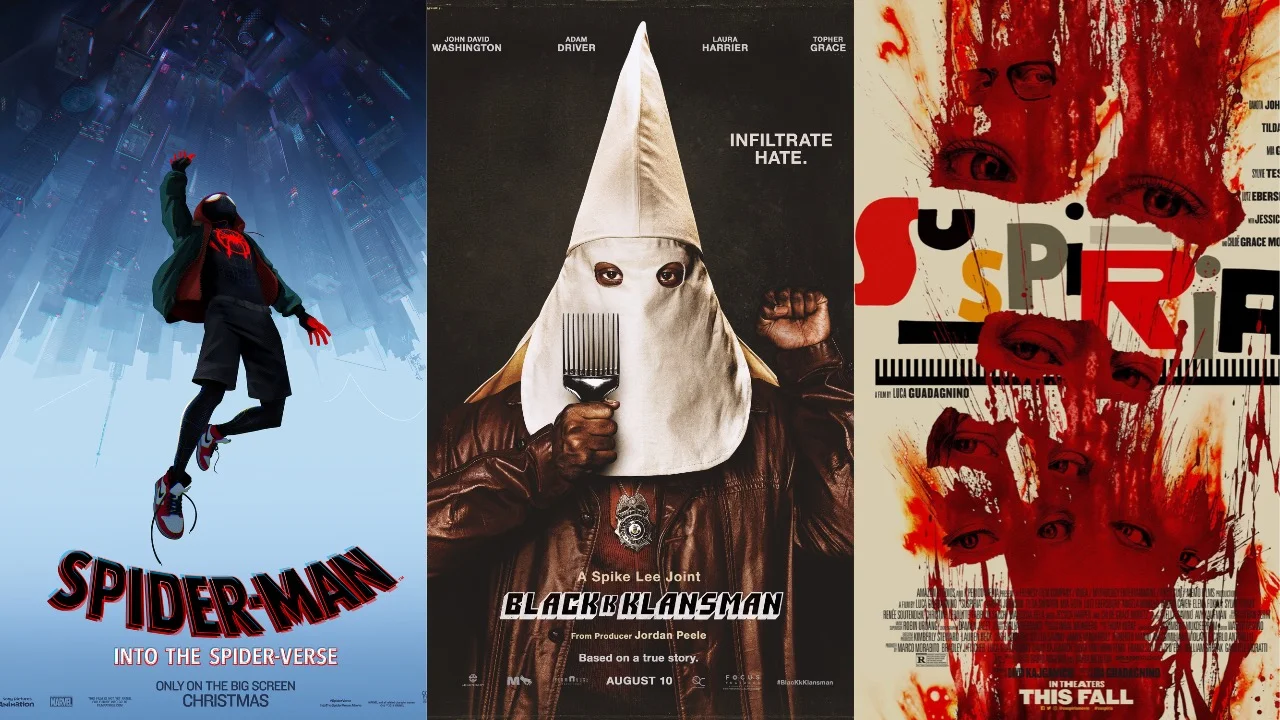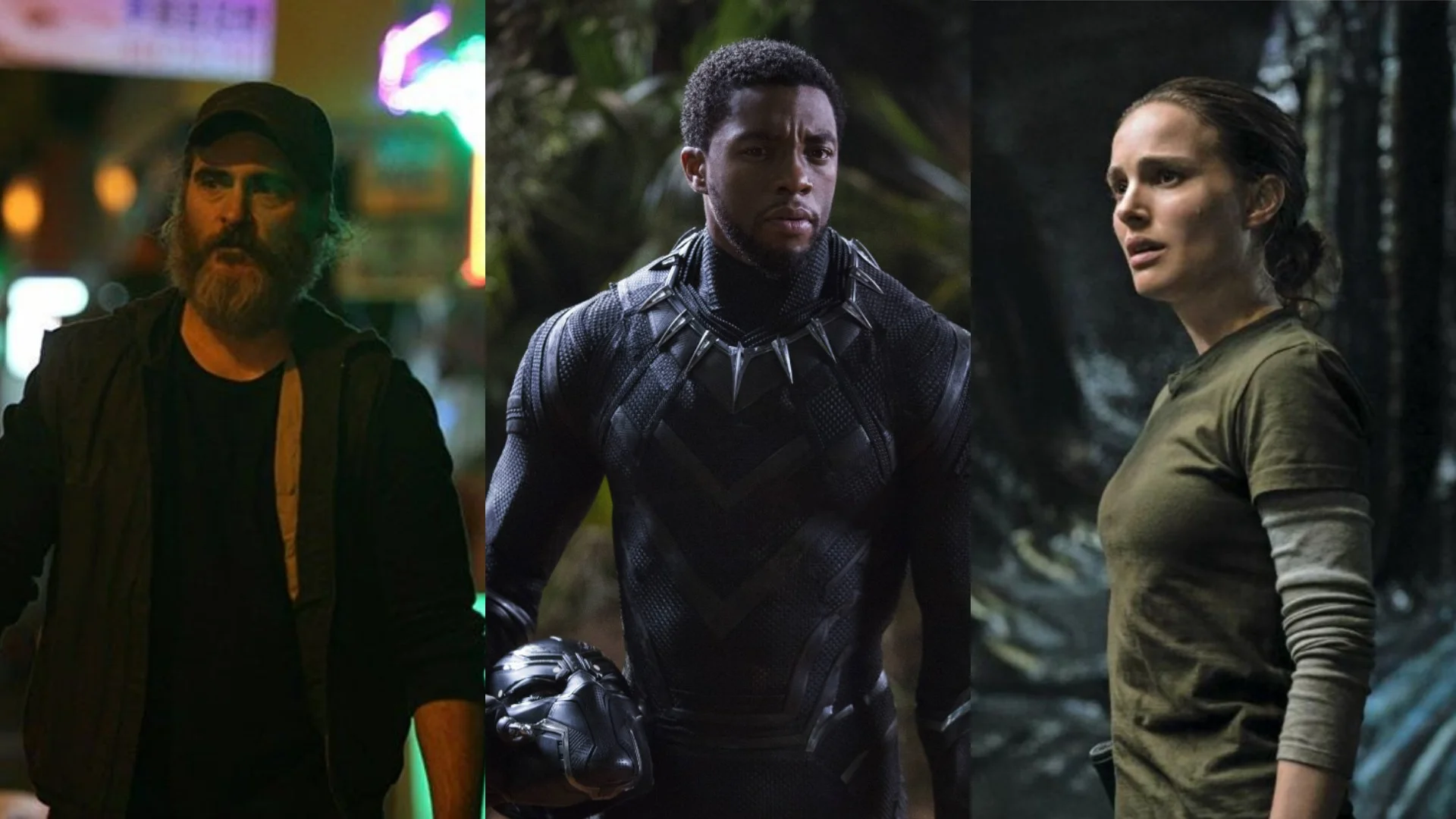Aaron's Top Ten Movies of 2018
I always finish the year with a list of films that slipped through the cracks. After 2018, that list seems especially long. Brady Corbet’s Vox Lux, Paweł Pawlikowski’s Cold War, and Marielle Heller’s Can You Ever Forgive Me? dot a very long list of movies I’ll surely be catching as they release on VOD and Blu-ray over the coming year. So, it’s remarkable that when I began looking at what made my top 10 and what fell just shy of those precious few spots, I felt a pang of pain.
Whether it was McQuarrie’s utterly electric reinvigoration of mainstream action blockbuster filmmaking in Mission: Impossible - Fallout, Sandi Tan’s infuriating and spectacular documentary Shirkers, Nuri Bilge Ceylan’s sublime and elegiac The Wild Pear Tree, Soderbergh’s warped and socially conscious lo-fi horror Unsane, Spike Lee’s barn-burner of a buddy-cop tale BlacKkKlansman, Panos Cosmatos’ horrifying psychedelic vision Mandy, or Bob Persichetti, Peter Ramsey, and Rodney Rothman’s stunning Spider-Man: Into the Spider-Verse, 2018 was stacked with remarkable works.
But, in a year so brimming with remarkable work from so many unbelievably talented voices, it was inevitable that many films I loved dearly wouldn’t make it past the chopping block. So, with that said, here are my top 10 of 2018.
10. Paddington 2 (dir. Paul King)
I’m new to the Paddington craze. I had heard about and admired the original from afar, but hearing people evangelie Paddington can, admittedly, seem like the ravings of a cult member. Posting multiple times a day, jars of marmalade in hand, costume adorned, with their own catchphrase, “If you’re kind and polite, the world will be right.” I mean, it sounds like a perfectly pleasant cult...but a cult nonetheless. So, when I finally gave in last summer and watched the first film, I got it. It’s just as pleasant and heartwarming as any of Pixar’s best efforts — no small feat in and of itself — but it also carries an explicitly pointed message, post-Brexit and post-Trump: Immigrants don’t come to another country with a dastardly plan to tear apart the culture of their new home, they come in search of a better life, and because of the new perspectives and cultures they bring, not in spite of them, immigrants grow and better the country around them. Paddington 2 takes this compassionate core conceit and amplifies the charm, warmth, and resonance of its message with a return to the timelessly brilliant physical comedy of Chaplin whose child-like spirit Paddington embodies with all his being. Don’t let it slip your radar, Paddington 2 is absolutely essential viewing for all ages.
9. The Favourite (dir. Yorgos Lanthimos)
I have been very hit or miss on the works of Greek auteur Yorgos Lanthimos. I generally enjoyed his 2015 effort, The Lobster, but beyond the wry, dark comedy and clever conceit — a hotel for singles who, if not paired by the end of a short retreat, are transformed into an animal of their choosing — I couldn’t quite get on board with the rapturous praise it received. I was even less keen on his follow-up The Killing of a Sacred Deer, in large part thanks to his affectation of Stanley Kubrick, without a coherent exploration of the themes of the films he took as key inspiration. So, I was pleasantly surprised to find that Lanthimos’ latest effort, The Favourite, grabbed me in a way none of the other of his works I’ve seen has. In stark contrast to the slipshod way Lanthimos builds on the unexplainable horror of Kubrick’s 1980 masterwork — The Shining with The Killing of a Sacred Deer — The Favourite is a marvelous adaptation of the tragicomic stylings of Kubrick’s most lavish work, Barry Lyndon. Bolstered by three unbelievably compelling central performances from Emma Stone, Rachel Weisz, and especially Olivia Colman, Lanthimos builds a tapestry of both absurd and grounded, tragic work, painting the royal court of Queen Anne as a place torn between the lavish importance of the throne, the tragic isolation of power, and the comic absurdity of the fashion, knowledge, and personalities of the court. It’s a remarkable film, both riotously funny and gorgeously coiffed in equal measure. And, to me, it’s Lanthimos’ most successful effort to date.
8. Eighth Grade (dir. Bo Burnham)
When I saw Bo Burnham’s poignant, intelligent, witty, and, most importantly, honest directorial debut, Eighth Grade, last summer I was head-over-heels in love. It spoke so acutely to an experience I know so intimately, and which so many know so intimately, despite never having been a young girl in eighth grade, that I couldn’t get it out of my head. Eighth Grade doesn’t just look, feel, and sound like eighth grade (surprise, surprise casting actual eighth graders as eighth graders leads to performances that feel like experiences from eighth grade), it resonates as a portrait of social isolation and social connection. Kayla’s struggle to speak — especially as someone who has been reserved all his life — feels so true to an experience every person who has ever lived past the age of thirteen knows intimately that it is no surprise this film had its moment of fame even in the midst of big-name, big-budget, splashy summer releases. Eighth Grade works brilliantly and it works so perfectly because of its unwavering empathy for Kayla. Every embarrassment, moment of vulnerability, or bad day hits so close to home because Bo Burnham is always on her side. Like a good parent, he knows when to give her her space, when to celebrate a moment of triumph, and when to get into her head. There really isn’t a missed beat here and it’s one of the most electric and remarkable features of 2018.
7. You Were Never Really Here (dir. Lynne Ramsay)
Lynne Ramsay is one of the five best directors working today. She’s an unbelievably confident voice with a distinct style and method of storytelling. Her latest, the mouthful You Were Never Really Here is a stunning update of Martin Scorsese’s masterpiece Taxi Driver. Joaquin Phoenix’s Joe is a veteran working security for a gubernatorial candidate when the job goes horribly wrong. It’s a bog standard set-up for a tale told in a way that is anything but. Ramsay’s nonlinear editing and almost surreal style fit beautifully with her tale of a veteran grappling with the very real possibility that he can never escape his past failings. Hints of previous jobs, his background as a soldier, and his abusive childhood home slip in and out of the narrative in jarring bits of fractal editing. Ramsay’s technique and form here are top-notch and the way she unravels this increasingly twisted tale of abuse and revenge is remarkably hands-off. It’s a breath of fresh air in a genre that often feels the need to fully explain every bit of motivation with crystalline clarity and it’s one of 2018’s best features from one of the world’s best contemporary directors. And, if this is your first foray into Ramsay’s incredible filmography, definitely seek out her equally stunning Morvern Callar from 2002.
6. Private Life (dir. Tamara Jenkins)
Tamara Jenkins is a name that was nowhere near on my radar before 2018. Out of simple ignorance (I hear her other works are equally impressive), I hadn’t seen her previous efforts. But, when I settled into her latest, Private Life, with little expectation beyond a Baumbach/Allen-esque tale of New Yorkers uncomfortable with their thoroughly comfortable lives, I was blown away. Paul Giamatti and Kathryn Hahn play a couple in their forties stuck in the limbo of the fertility treadmill. When their 25-year-old niece offers to be an egg donor, Jenkins launches into an odyssey of social realist drama evocative of both Cassavetes and Allen, but somehow totally fresh. It’s one of the most cleverly-written films of the year with brilliantly funny dialogue that plays less on the melodramatic tribulations of being an erudite and well-read New Yorker in a world that makes less and less sense than on the very real and very messy quandary of broaching uncomfortable and taboo questions with the ones we love. And it feels all the more approachable and all the more resonant because of that. Private Life is no slouch visually, either. Jenkins composes a film of sterile doctor’s offices with cavernous negative space that threatens to swallow the couple whole. It’s a film that manages to be about the ironic inhumanity of the healthcare system, the difficulty of coming to terms with one’s own age, the discomfort of relying on the generation after you when it is so ingrained in us that it should be the other way around, and so much more. And, it’s on Netflix right now, so there’s no excuse for not watching it.
5. Sharp Objects (dir. Jean Marc-Vallée)
My fifth favorite of 2018 isn’t technically a film (though I’ve always been wary of the rigidity with which we draw the distinction between TV, which is essentially a more rigidly episodic form of film, and movies), but it is one of the most gripping pieces of cinema I saw last year. I was less than enraptured by what I saw from Jean Marc-Vallée before his Big Little Lies two years back. But, his deliciously salty work on that miniseries — an eminently watchable tale of California moms surviving and making the most of generally awful situations — was brilliant. It allowed his ensemble piece — populated by some of the best actors working today — to breathe life into tired stereotypes and create tragedy (and triumph) from some of the most keenly observed portraits of the last several years. His latest, the Amy Adams-led Southern Gothic masterpiece, Sharp Objects, sublimates its tropey tale of past traumas bubbling up on a return trip home to create something altogether more surreal and compelling. The sound design, a mix of ethereal, woodsy, synthy tracks replete with binaural, ear-tickling tricks is both sublime in its pure experiential pleasures, but also remarkably grounded in the intensely subjective point-of-view of its main character. The story may not be the most novel of tales — if you know the tropes of Southern Gothic storytelling or any homecoming narrative, you’ll likely see the ending coming a mile away — but it is so brilliantly rendered with some of the best cinematography, performances, dialogue, and sound design of the year that it is a must-watch.
4. Burning (dir. Lee Chang-dong)
I hadn’t been grabbed by anything from Korean auteur Lee Chang-dong before. I had dabbled in his work in the run up to his latest, Burning, just to see what all the fuss is about. But, Burning worked for me in a way none of the other of his works I’ve seen has. Like the Faulkner story it references, Burning is an atmospheric tale of destructive and peculiar tendencies. It’s both gorgeous and grotesque. It’s a slow-burn for sure, but all of its central performers, even the catatonic Yoo Ah-in (whose work here is pitch-perfect for his character), turn out brilliant work. Of particular note, though, are Steven Yeun of Walking Dead fame whose Gatsby-esque Ben treads the finest of lines between deliciously mysterious and vaporously vapid and Jun Jeong-seo whose equally mysterious Shin Hae-mi also walks a fine line between mysteriously seductive and shallow emptiness. It’s impressive work and it surely won’t work for everyone, the film is meandering and, at times, frustrating. But like the fog chapter in Joseph Conrad’s Heart of Darkness, the aimlessness adds up to bolster and enrich the central themes and malaise of the tale. And, if nothing else, the film’s three central performances are eminently watchable, Yeun, in particular, here is doing some of his very best work. It also has some of the most remarkable cinematography of the year with smoky, magic-hour-tinged compositions that help foster the film’s dream-like (or more appropriately, nightmare-like) atmosphere.
3. If Beale Street Could Talk (dir. Barry Jenkins)
When I reviewed Barry Jenkins’ latest for Talk Film Society, I noted that “Barry Jenkins is a modern master clearly in total command of the form and, like Scorsese’s love affair with Fellini or Paul Thomas Anderson’s with Kubrick, Jenkins has adapted the stylings of Wong Kar-Wai to his distinct and rapturous voice.” But, simply praising his cinematic inspiration sells his latest short. Like the author of his source material, James Baldwin, he is a socially conscious artist using the empathetic power of art to shine a light on stories from the margins. Jenkins is one of the great artists of our modern age and his work, if it continues on the track he’s forged for himself thus far, will stand the test of time. If Beale Street Could Talk is both timely and timeless and it manages to adapt a master’s work to a new master’s voice. And, perhaps most tragically, cement the relevance of a half-century old tale in 2018. It demonstrates the permanence of police brutality, consistent marginalization of racial minorities, but also of love and of endurance in the face of overwhelming odds. That he was able to follow up his sublime Moonlight with a work that is, in my estimation, just as good is no small feat. Here’s hoping more people will notice.
2. Shoplifters (dir. Hirokazu Kore-eda)
Hirokazu Kore-eda’s latest is a remarkably compassionate work from the Japanese master. With Shoplifters he has crafted a film that is reverent of both Ozu and the masters of the Italian Neorealist movement. It’s compassionate, articulate, honest, and quietly beautiful. In my review for Talk Film Society I noted that, “His film never loses sight of the humans at the center of the tale so that, when the film does bend back around to answer the moral quandary posed at the start, it has been contextualized with all the warmth, compassion, and growth that only a family can provide.” It’s the quiet moments that Kore-eda nails and that’s perhaps the film’s greatest triumph. It doesn’t go for the typical contrived dramatic beats that so many family tales lean on to bolster the drama. Kore-eda is confident enough in the characters he has crafted and the compassionate lens through which he views their plight that the film is comfortable to keep it subtle and to keep it honest. The result is something heartwarming because of how it recalls moments in our own lives without nudging and winking at the audience through “relevance”. It will come as no surprise that Kore-eda’s most recent is a brilliant and empathetic film to those who have been paying attention, but to those who haven’t, give his latest a shot, it’s more than worth a watch.
1. First Reformed (dir. Paul Schrader)
When I saw my favorite film of the year back in May I knew it wouldn’t be dethroned. It’s now one of my favorite films of all time. It speaks to my interests and concerns so deeply that it was inevitable that it would nab my number one spot. I’ve spent much of my time fashioning my career, both academic and otherwise, around the problem of climate change and health. It’s an issue that isn’t just pressing in its existential threat, but important in its variegated ramifications in virtually every field. So, when I saw First Reformed, Paul Schrader’s most direct spiritual sequel to Taxi Driver, I couldn’t stop thinking about the film. I’ve seen it several times since my first viewing midway through last year and it holds up marvelously. Ethan Hawke’s Reverend Toller is one of the best performed characters of the year — a prophet gradually convinced he’s witnessing the decay of life as it is before his very eyes — and it works so well because, usually when a prophetic priest pops up in film, he’s a nut, a fool to be laughed at for his overestimation of the moral doom encroaching on civilization. But, it’s hard to argue with the despair that Reverend Toller experiences. It’s not only understandable, but rational. He’s right to despair and fret. He’s right to grow weary and frustrated at the hypocritical inaction of the local church and the massive polluter down the road. It is perhaps the first narrative film from a prominent voice in American cinema to treat explicit and real environmental catastrophe as the truly terrifying threat that it is. And Schrader’s formula works oh so well here. The disaffected and horrifying agony of Travis Bickle is transmuted to a more explicitly spiritual and more overtly disturbed character here and I’m tempted to say that Schrader pulls almost as remarkable a performance from Hawke as Scorsese did from De Niro all those years ago. It’s certainly not a pleasant watch, nor should it be, but the more I’ve thought about this film and the more I’ve revisited it, the more I’ve found it to be a thoroughly satisfying existential horror. It’s some of Schrader’s very best work, which is saying a lot considering the man has practically shaped cinematic grammar for the past forty years.



















